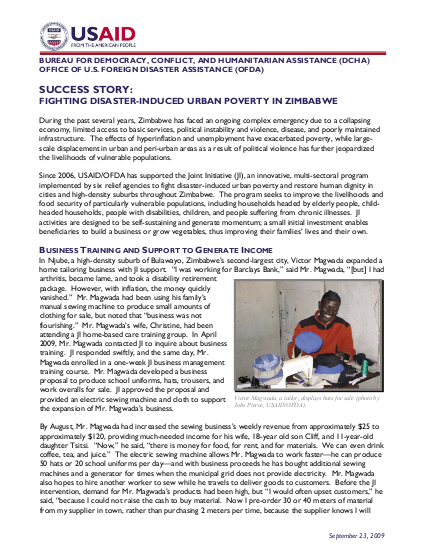
During the past several years, Zimbabwe has faced an ongoing complex emergency due to a collapsing economy, limited access to basic services, political instability and violence, disease, and poorly maintained infrastructure. The effects of hyperinflation and unemployment have exacerbated poverty, while large-scale displacement in urban and peri-urban areas as a result of political violence has further jeopardized the livelihoods of vulnerable populations. Since 2006, USAID/OFDA has supported the Joint Initiative (JI), an innovative, multi-sectoral program implemented by six relief agencies to fight disaster-induced urban poverty and restore human dignity in cities and high-density suburbs throughout Zimbabwe. The program seeks to improve the livelihoods and food security of particularly vulnerable populations, including households headed by elderly people, child-headed households, people with disabilities, children, and people suffering from chronic illnesses. JI activities are designed to be self-sustaining and generate momentum; a small initial investment enables beneficiaries to build a business or grow vegetables, thus improving their families’ lives and their own.
Resource collections
- UN Habitat - Urban Response Collection
- Urban Response - Urban Crisis Preparedness and Risk Reduction
- Urban Response Collection - Community Engagement and Social Cohesion
- Urban Response Collection - Economic Recovery
- Urban Response Collection - Environment and Climate Change
- Urban Response Collection - Housing, Land and Property
- Urban Response Collection - Urban Crisis Response, Recovery and Reconstruction
- Urban Response Collection - Urban Resilience